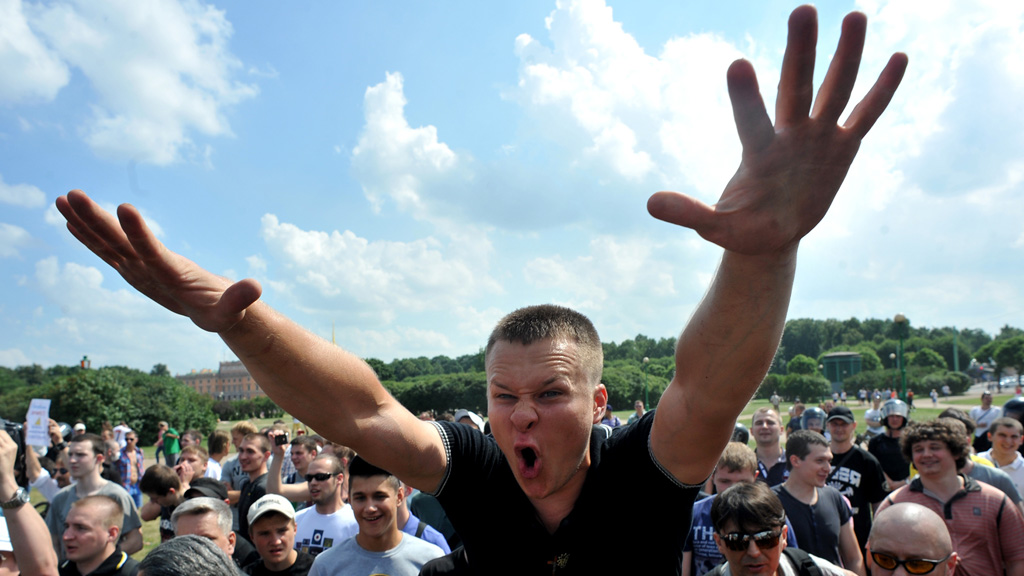Will an Olympic boycott actually help gay Russians?
As pressure to take the Sochi Winter Olympics away from Russia intensifies, we look at President Putin’s anti-gay propaganda law and ask if an Olympic boycott will promote change.
Another young man has fallen prey to an attack from right-wing homophobic bullies after replying to an ad on a dating site, reports Spectrum Human Rights Alliance, one of the first voices to report on the recent surge in aggression against gay people in Russia.
A video posted on the Russian social networking site VK.com shows a 17-year-old lured to a meeting after an exchange on a gay dating site. But instead of meeting the 22-year-old he thought he had been talking to, he is surrounded by a group of men who insult him, force him to call his parents and employer, and out him on the internet video, stating his name and address.
Olympic protest
Dozens such videos have been posted in groups with thousands of members – showing men being beaten, soaked in urine and much worse, and they have created a storm of protest from celebrities including Lady Gaga, Tilda Swinton and Stephen Fry. Mr Fry has called for the Winter Olympics in Russia to be boycotted. Pressure has pushed the head of the International Olympic Committee to request a clarification from Russia on the extent of its anti-gay laws, and Vitaly Churkin, Russia’s ambassador to the UN, has been pushed into defending his country’s position to the media.
The vigilante groups are not state-sponsored, but it is a law brought in by President Putin in July that has opened the door for this rash of violence, argue human rights groups.

Putin’s law
The law – Article 6.21 of the code of the Russian Federation on administrative offences (translation) – mandates fines of up to 500 rubles for people who “create non-traditional sexual attitudes” by distributing information to minors. Using the internet to spread such information carries a fine 20 times higher. Even creating “an interest in non-traditional sexual attitudes” is illegal.
At the time, Mr Putin claimed that the law would increase the birthrate in Russia. However, the immediate impact has not been on pregnancies but on Russia’s gay population, who have become targets for police action, with the police arresting people on pride marches and those displaying openly gay characteristics such as carrying rainbow flags, holding hands with a partner or even, in one case, “looking gay”.
The vagueness of the terms has contributed to their very broad interpretation by police. Pink News has catalogued the worst examples of its enforcement.
More serious for gay people is that law enforcement has turned a blind eye to gay persecution.
Speak up, don’t walk out!
But while better communication would be good, a boycott will not help things, say Russian LGBT groups who have stated that gay rights supporters need to “speak up, not walk out”.
“Boycotts will mean nothing to Putin,” said Clare Dimyon, a long-term campaigner for LGBT rights in Russia and eastern Europe. She told Channel 4 News: “He doesn’t care. We need to think of more long-term strategies.”
After speaking to gay activists in Russia on Friday, Ms Dimyon said that Russian gay people were “not hiding under the bed”. But she said that groups had realised the need to mobilise and connect better.
“There have been isolated atrocities but gay people are not being pulled off the street and tortured.
“No-one is hiding under the bed. They are still using social media. Life is going on.”
She said gay people in Russia tended to use Facebook to communicate, considering it safer than VK.com, the Russian-language equivalent, and urged supporters in the west to engage with Russia rather than staying away.
-
Latest news
-
Taylor Swift’s new break-up album breaks records3m

-
NHS trust fined £200K for failings that led to death of two mental health patients3m

-
Sunak vows to end UK ‘sick note culture’ with benefit reform3m

-
‘Loose talk about using nuclear weapons is irresponsible and unacceptable’, says head of UN’s nuclear watchdog3m

-
‘There wasn’t an Israeli attack on Iran,’ says former adviser to Iran’s nuclear negotiations team7m

-




